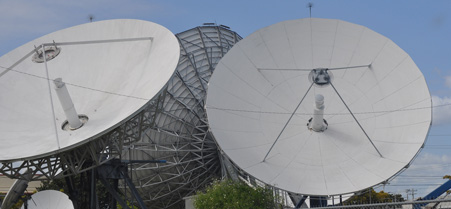FCC official provides more details on possible broadcasting participants
 Flickr user lonnypaul
Flickr user lonnypaul
Las Vegas - The head of the Federal Communications Commission's Media Bureau gave a few more details on which broadcasters may participate in incentive auctions to make more spectrum available for wireless use, saying some stations have inquired about possibly sharing channels.
FCC Media Bureau Chief William Lake and media analyst Mark Fratrik, vice president of BIA Kelsey, also said that some investors have been buying up broadcast stations in recent years with the intent of offering their spectrum for auction as part of the proposal authorized by Congress in February. Under the process, broadcasters that choose to participate will offer a bid for what it will take for them to give up all their spectrum and get out of the business, give up of their spectrum and share a channel with another broadcaster, or trade their UHF channel spectrum for a lower-quality VHF channel.
"There are purchases of television stations in the most recent few years ...in anticipation of the auctions," Fratrik said at the National Association of Broadcasters annual show. "We've seen prices of television stations that were sold only two or three years earlier go up by several hundred percent in large markets...These tend to be independent stations that are obviously players on the reverse auctions. So I think you're having an impact already, and it's a positive one."
But he added that there's still much uncertainty and concern among broadcasters about the "rules of the road" and how the repacking process will work, which will involve moving broadcast stations that plan to stay in business in order to create a chunk of spectrum that can be auctioned for wireless providers.
Lake said he expects the commission will release a "big" notice of proposed rulemaking by the fall or a series of proposed rules that will outline some of the issues related to the "reverse" auctions where broadcasters will offer up their spectrum for auctions and the "forward" auctions involving wireless operators and others that want to bid for those airwaves.
"We want to eliminate uncertainty...in order to allow people to talk to their financial advisers or whatever and assess whether contributing to the auction is an option for them," Lake said.
While NAB officials noted that few broadcasters have told them they will participate, FCC Chairman Julius Genachowski said in a speech at the NAB show Monday that the FCC has gotten calls from "many" broadcasters who expressed an interest in possibly participating in the incentive auctions.
Lake said the commission had been contacted by lawyers or brokers representing stations who had asked about what share of the auction proceeds stations would get or wanted more details on sharing channels. He added that a broadcaster approached him Monday at the NAB show and said he would be selling his spectrum. Lake said that the spectrum law requires the commission to keep information on those broadcasters who participate confidential until their bids are accepted.
"This is all anecdotal. There's no way to know how many stations" will participate, he said. But he added, "We think it's a positive sign that we have broadcasters out there considering this as an option."
Fratrik said independent stations in big markets with many television stations or public television stations, particularly those in markets where there is more than one public TV broadcaster, may find it makes sense to share spectrum with another broadcaster or get out of the business altogether. "If you're one of the weak independents ... it may be more valuable to give up half or all of your spectrum," he said after the session.
But there can be limits to channel sharing including preventing for the most part stations from broadcasting in high-definition and multicasting, which involves sending multiple streams of programming at the same time using the same 6 megahertz of spectrum.
NEXT STORY: How cloud storage could catch up with big data





